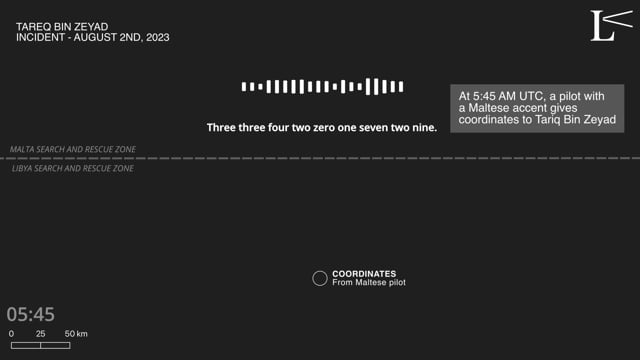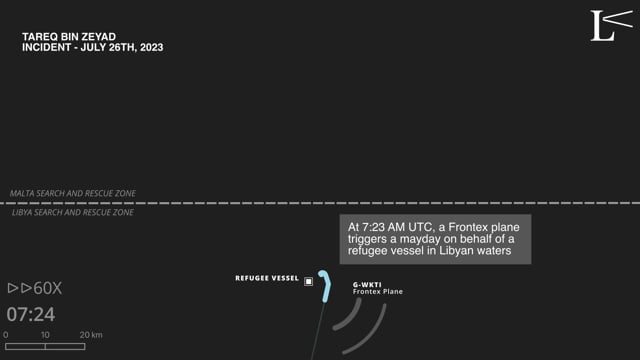Malta provided migrant boat location to Libyan militia with human trafficking ties
A shadowy militia knee-deep in human smuggling keeps pulling migrants back to Libya from the Maltese SAR, detaining them until a smuggler buys their freedom • Both Malta and Frontex have given coordinates to this militia

By Nicole Meilak, Mahammad Bassiki, Bashar Deeb, Maud Jullien, Tomas Statius
Key findings
- A Maltese AFM pilot has communicated coordinates directly to a Libyan militia group called the Tareq Bin Zayed (TBZ), leading to a pullback to Libya from Malta's SAR
- Maltese officials have confirmed that they collaborate with the Libyan coastguard in both the East and West. This includes providing surveillance assets, training and humanitarian aid.
- Survivors report serious human rights violations at the hands of the miltia group's boat operators, including torture, ransom and forced labour
- Confidential EU documents indicate the brigade is supported by Wagner and Sudanese mercenaries
- EU authorities aware that local Eastern and Western Libyan officials and militias are benefiting from human trafficking, and are getting involved in migration management to gain international support
They were promised a one-way trip to Europe. But when around 500 people departed from Tobruk on a fishing vessel last May, their trip was cut short when the engine stopped working and the boat was adrift in Malta’s search and rescue zone.
It was only a matter of time before a large boat, painted blue and white, approached them on their first night at sea. The crew shot at them, tried to drown their boat, and eventually pulled them back to Libya.
Two days later, the migrants disembarked at the Benghazi fishing port.
This was the first recorded time that this vessel, the Tareq Bin Zeyad, took migrants back to Libya from Malta’s search and rescue waters.
But it wasn’t the last. A new investigation by reporters from MaltaToday, Lighthouse Reports, Al Jazeera, Der Spiegel, Le Monde and SIRAJ explores how this vessel, and the Libyan militia that operates it, have been coordinating pullbacks in the Maltese SAR zone for months – with help from the Armed Forces of Malta and the EU’s border control agency Frontex.

Friends helping friends
In the early morning on 2 August, a Maltese pilot in the AFM was speaking on Marine VHF radio and started to communicate with the Tareq Bin Zeyad – the name of the vessel and the Libyan militia brigade that operates it.
“Benghazi Coastguard, Benghazi Coastguard,” he repeats over the radio. “Tareq Bin Zeyad, Tareq Bin Zeyad. I have a position for you. Do you want the position?” he continues.
“You were looking for something? I give you the position. It’s moving. You can tell me when you’re gonna-“. The recording stops there.

Later in the day, an NGO aerial asset called Seabird found a big burning blue vessel in Malta’s SAR. Ten minutes later, the same aircraft found the Tareq Bin Zeyad vessel nearby with a group of people sat on the ship’s deck.
MaltaToday approached the AFM with this recording, and asked whether it was standard practice to communicate with the Tareq Bin Zeyad brigade. A spokesperson for the AFM said that aircraft pilots “are obliged to transmit information to vessels in the area where there is the possibility that a vessel will be involved in providing assistance”.
The AFM did not confirm nor deny that it is standard practice for them to communicate with the Tareq Bin Zeyad brigade.
Nora Markard, an expert in international law, said this incident is a clear violation of the law of the sea. “One might call it pushback by proxy, with TBZ acting on behalf of Malta,” she said.
“They shot at our boat”
Ahmed* tried several times to make the crossing from Libya to Europe, paying upwards of $1,000 for every attempt. In May, he went to Tobruk and paid another $700 to a smuggler for another try. He boarded the same boat with around 500 people on board that was pulled back to Benghazi on 25 May.
“The people in charge of the boat were from Egypt. They were very bad and did not provide us with food and drink,” Ahmed said. It took them five days to reach the Maltese search and rescue zone, but it was at this point that the captain said the engine broke down.
“We knew that this was not the case, but he issued a distress call, and we remained at sea for the sixth day when we were surprised by the Tareq Bin Zeyad,” he said.
“They tried to drown us first and shot at our boat and hit us, but we did not drown, so they abandoned us and left after the waves rose. We remained floundering in the sea until the next day, then they came back and dragged us to Benghazi.”
Another migrant, Hasan*,was on the same boat. He said the TBZ tried to tie their boat to the vessel to tug them back to Libya, but the migrants on board cut the rope and tried to escape.
“They told us to turn off the engine or else they would drown us. We didn’t respond to them, so they started deliberately hitting our ship with theirs in an attempt to sink us. Our boat was about to sink as it tilted and then turned, so they took out machine guns and started shooting at us and the boat randomly, as well as in the air.”
Who is the TBZ?
The Tareq Bin Zeyad brigade (TBZ) is a military force in Eastern Libya led by Commander Saddam Haftar, the son of military leader Khalifa Haftar. It forms part of Haftar’s Libyan Arab Armed Forces (LAAF) and is one of its largest armed groups. According to confidential EU documents seen by journalists, the brigade is supported by Wagner and Sudanese mercenaries.
On TikTok, the crew have also been showing off their new boat. In their videos, they can be seen cutting raw meat for a barbecue. In another video, one of the members can be seen holding a Playstation controller.

But the brigade is known for its aggressive behaviour and human rights abuses. Amnesty International published a research briefing last year documenting the many crimes and abuses of the TBZ, which include torture, rape and hostage-taking.
These crimes aren’t limited to Libyan civilians. Reporters spoke to several migrants who have experienced this abuse first-hand. Bassel*, a 36-year-old father of two kids, was beaten until his body turned black. Another migrant, Hasan*, saw a soldier shoot and kill one of the migrants on board a vessel at sea. After shooting him, the soldier threw his body into the sea. Meanwhile, Ahmed* was forced to drink from a toilet while detained by the TBZ.
“I do not advise anyone to come to Libya because they will suffer,” Ahmed told journalists. “There is a lot of what I went through that I cannot describe or talk about because of how bad it is.”
READ ALSO | Torture, murder, humiliation: Meet the militia carrying out pullbacks in Maltese SAR zone
Frontex mayday leads to pullback
The AFM is not the only European authority that has provided coordinates with the TBZ. On 26 July at 7:17am, an aerial asset operated by Frontex was found circling a boat in Malta’s search and rescue area. At 7:23am, they issued a mayday relay call, which is a call on behalf of another boat. According to Frontex, the boat was dangerously overcrowded and in imminent danger. Around 10 minutes later, the radio call was acknowledged by the TBZ.

Markard, the international law expert, said that Frontex should have ensured that someone else took over the rescue after the distress call, such as one of the nearby merchant ships.
"Frontex officials know that people in Libya are at risk of torture and other inhumane treatment," she said. "What the militia is doing is more of a kidnapping than a rescue. You only have to imagine pirates announcing that they will deal with a distress case. That wouldn't be right either."
The law of the seas says that the closest vessel should be tasked with rescuing when a mayday is issued. Yet there were several other assets closer to the case, including two merchant vessels. Indeed, it took the TBZ nearly seven hours to reach the distress case.
Peter Stano, an EU spokesperson for foreign affairs and security policy, told reporters that a Libyan vessel can be tasked with a distress case in Malta’s search and rescue zone, but only if that boat is sailing very close and there is no other vessel nearby.
“This is the principle as defined by the Law of the Sea. Whoever is in a position to be fastest and closest to these people in peril, are obliged to rescue them.”
Stano said the EU is aware of the TBZ, but does not classify it as a political party, militia or armed militia, nor a designated terrorist group.
Rather, the TBZ is one of the actors that exist and operate in Libya, at least for the EU.
“They are not our preferred partner. We don’t deal with them. They are not someone who would be an appropriate interlocutor for us,” Stano said.
.jpeg)
Malta courts Haftar
Last May, a Maltese diplomatic delegation met with Eastern Libya’s military leader Khalifa Haftar for the first time.
A high-ranking Maltese official told reporters that Malta discussed possible collaboration on migration with Haftar in Libya, with the AFM tasked to discuss the next steps.
“Our geographical reality brings us to the periphery of dealing with migration between Europe and Africa. This means we not only have to deal with migrants and refugees but also human trafficking and smugglers. So it is important for us to formulate policies which also cater to our security and defence policy. So yes, we are collaborating with the Libyan coastguard both in the East and the West. What we mean by collaboration is we provide assets (surveillance), training, humanitarian aid.”
The official said Malta is trying to support Libya so that people can find work there and stop trying to cross into Europe illegally. “For us, it is a matter of existentialism.”
At Malta's meeting in Benghazi last May, the official described Haftar as the man everyone wanted to talk to at the time. “You can’t deal with Libya, as a whole, without talking to him.”
Indeed, many European leaders have turned to Haftar, who has risen to become a central figure to Libya’s military political complex. A few weeks before the Maltese delegation’s visit to Benghazi, Italian Premier Giorgia Meloni met with Haftar for a two-hour long meeting in Rome. Migration was very much on the agenda, as was instability in Libya.
The migration cycle
Migration is a complex debate with deadly consequences. Last June, a rusty vessel with hundreds of refugees and migrants sank near the Greek coastal town of Pylos. They had departed from Tobruk, but the vessel went into distress three days later. The 750 people on board were presumed dead.
And at least four of the people who died in the shipwreck were on the boat that was pulled back by the Tareq Bin Zeyad in the Maltese search and rescue zone last May.
Recently, Prime Minister Robert Abela insisted with German Chancellor Olaf Scholz that Malta is focused on preventing arrivals and fighting against human trafficking. European Commissioner president Ursula von der Leyen similarly said that the EU is committed to fight human smugglers.
Yet in providing coordinates to the TBZ, both the AFM and Frontex are inadvertently fuelling the brigade’s smuggling activities in Libya, allowing its officials to extort migrants for thousands of dollars while enjoying protection from the higher powers in the east.


.png)


















